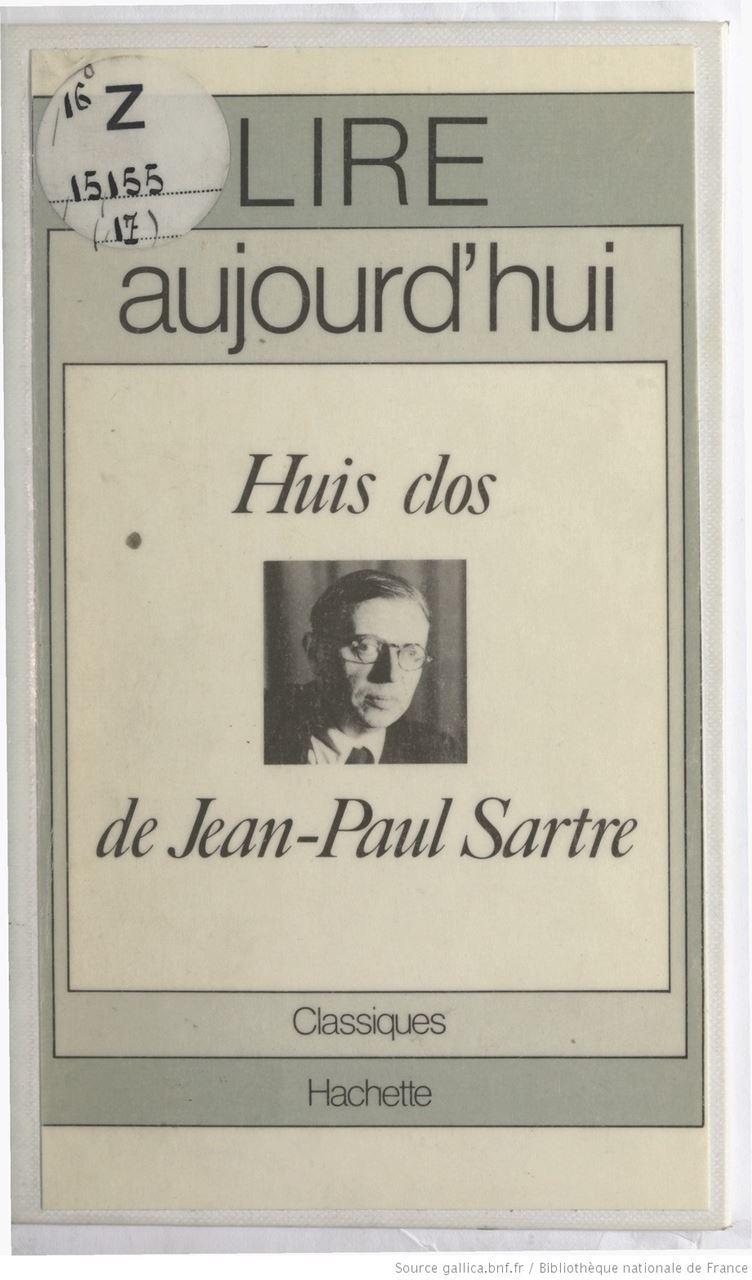
By Aileen Ruane
The COVID-19 pandemic has disrupted our quotidian, but has also served to reintroduce scholars and the general public alike to some of literature’s most timely works. Chief among them has been the 1947 novel La Peste by Albert Camus, which recently returned to the top of the best-seller list, over 70 years after its initial publication. Dr. Jennifer Frey’s philosophy, theology, and literary criticism podcast features an episode in which the novel’s pertinence to this pandemic is discussed under its English-language translation, The Plague. La Peste’s indelible presence in literary studies and popular culture is well-documented: allegorical meanings, the Algerian War, depictions of illness and space, linguistic structures and innovations all contribute to its grim resurgence in popularity in 2020.
However, Jean-Paul Sartre’s 1944 play Huis clos epitomizes another potentially advantageous perspective on our quarantine moment. While Camus’ novel illustrates daily life during a plague (including eerie resonances for 2020), Sartre’s existentialist, one-act play exposes our contemporary preoccupations with what other people are doing and thinking in relation to one’s self. It questions whether or not we would act in such ways towards one another if we knew we didn’t have some kind of audience. The notion of performativity advances the argument that identities are formed through a series of iterated acts that are internalized to the point of appearing to be inherent.
Whether in a negative or positive sense (or something betwixt and between), our identities are therefore performances that we embody in relation to our communities and society writ large. The boredom, frustration, and anxiety that first materialize during confinement eventually reveal graver concerns about the nature of being, doing, and relationships. We need only refer to the confusion, anxiety, and even rage surrounding the obligation to wear masks or avoid gatherings as examples of our preoccupation with what the Other is doing and how that necessarily affects our being. Due to continually evolving information about the nature of the virus and public health authorities’ efforts to mitigate the death toll, simply minding one’s own business and forgetting the Other’s presence has proven difficult, especially given the complex relationships among consumers of social medias, which have been exacerbated during lockdown. 
Moreover, Huis clos predicts the mounting horror that boredom has brought on during this pandemic through social media platforms. Throughout the play, the three characters struggle with interacting in confinement, in part due to preoccupations over whoever is not involved in a particular interaction. After having ostensibly agreed to remain silent and immobile for the duration of their confinement, Estelle still needs to apply her blush and lipstick, but finds she has no mirror. While Garcin mutely ignores Estelle’s requests to loan her one, Inès offers help, stating “aucun miroir ne sera plus fidèle” than her own gaze.[1] During their ensuing dialogue, Estelle continues to call out to Garcin, worried that they are boring him, yet also expresses relief that “heureusement que (elle jette un coup d’œil à Garcin) personne ne m’a vue” upon learning from Inès that the lipstick was applied poorly.[2]
Boredom quickly turns to anxiety, and despite Estelle’s words to the contrary, her performance of femininity is connected to an awareness of Garcin’s presence. Even though NYU provided students who are quarantining in its dormitories with digital access to exercise, mindfulness, and social programming, students admit that it’s not the same as face to face interaction, and that there’s an inherent difficulty/lack of motivation associated with working out alone in a dorm room. They’ve taken to various social media platforms in order find mutual commiseration.
Unlike Sartre’s characters, we are not necessarily confined to a literal single room, yet we still experience the anxiety-inducing effects of the Other’s gaze, due to the prevalence of applications like Facebook, Twitter, Skype, and Zoom: are we doing as much as the next person? Are we perhaps too productive? Why aren’t they wearing masks? How will people react if I appear to transgress? These platforms expand upon the space — mise en scene encompassing the world of the play to global performance scenes — described by Sartre to fit our contemporary moment, all whilst redefining and reconstructing confinement as having as much to do with the object(s) of our own gaze as it does with that of the Other. Like Huis clos, social media constructs a form of embodiment by performing connection, even whilst we are quarantined or resistant. Like Garcin, Estelle, and Inès, our preoccupation with the Other diminishes any real opportunity to tune out, thus choosing to remain confined in a hell of our own making, as Inès states.
We can speak of performance thanks to the generic differences between La Peste and Huis clos, which subsequently help to explain the latter’s relevance in 2020: Camus’ novel allows the reader to experience the town of Oran from a distance through its narrative and linguistic structure, whereas Sartre’s play plunges the audience, as a community, into a present-tense exploration of the Other’s gaze. Whereas Camus’ narrative eventually concludes, Sartre’s trio realizes that they must, in the words of Garcin, “continuons.”[3] It is this performance in forced confinement to which the audience is party that makes Huis clos an uncomfortable corollary for us right now.
In the play’s final scene, Garcin makes the infamous pronouncement, “l’enfer, c’est les Autres”[4], essentially meaning that human beings are relentlessly conscious of the Other’s regard, and are thus subject to the increasing anxiety that results from the inability to ignore such a preoccupation. Interestingly, Sartre admits that Garcin’s assertion has a more pragmatic application. In a recorded interview, Sartre claims that the impetus behind the narrative structure for Huis clos was a desire to craft a play in which the three main characters would always be on stage together.[5] The reason for this was that if one of them ever left the stage, s/he would constantly worry that the other two had bigger, more significant roles to play.
In linking his philosophy to the pettier aspects of the theatrical medium, Sartre essentially theorised the “fear of missing out” (FOMO) long before social media. When Garcin demands that they endure their sojourn in hell by closing their eyes and attempting to forget one another, Inès immediately resists, wanting instead to “choisir [son] enfer”, through hyper-awareness of what Garcin and Estelle could be doing.[6] Pretending is an act of bad faith, so it is better to engage rather than allow the object-person of one’s attention to divert this attention elsewhere.
Our pandemic event transforms the notion of FOMO as suggested by Huis clos and Inès’ vow to never leave her fellow captives in peace. From the exasperated rebukes of “it’s just like the flu!”, through the various phases of lockdown, to tentative reopenings and a disheartening return to quarantine, the concept of hell being other people proves apt during a period in which we deliberate the ethics of reporting our neighbours to law enforcement, should we suspect them of flouting lockdown regulations. The anxiety induced by the Other’s gaze when we’re simultaneously physically isolated and electronically connected demonstrates the broad scope of the play’s relevance.
In the end, Sartre’s characters form a cautionary tale for us as we trudge forward with an “eh bien, continuons” during a pandemic that shows little sign of abating just yet. As such, Huis clos implicates a wider community than simply that of its characters. Because it is expressed via the first-person plural, present tense form, Garcin’s comment opens up to directly address and include us, asking us to actively consider the choices we make, the manner in which we treat the Other, even from a social distance.

[1] Jean-Paul Sartre, Huis clos suivi de Les mouches, Gallimard, 1947, p. 45.
[2] Jean-Paul Sartre, Huis clos, p. 46.
[3] Jean-Paul Sartre, Huis clos, p. 94.
[4] Jean-Paul Sartre, Huis clos, p. 92.
[5] See “Sartre – L’enfer, c’est les autres ‘Explications’”, https://www.youtube.com/watch?v=Q6-RWlmtqkY
[6] Jean-Paul Sartre, Huis clos, p. 50.
 Aileen Ruane is a Fonds de recherche du Québec – société et culture (FRQSC) postdoctoral fellow at Concordia University. She holds a PhD in Études littéraires from Université Laval where her dissertation took a comparative approach to the analysis of Québécois translations of Irish theatre via the notion of performativity. Her current project looks at performing/performative femininity/feminisms in Irish and Québécois theatrical translations.
Aileen Ruane is a Fonds de recherche du Québec – société et culture (FRQSC) postdoctoral fellow at Concordia University. She holds a PhD in Études littéraires from Université Laval where her dissertation took a comparative approach to the analysis of Québécois translations of Irish theatre via the notion of performativity. Her current project looks at performing/performative femininity/feminisms in Irish and Québécois theatrical translations.
Twitter: @Francophoney82
Photo credit: Étienne Richard
